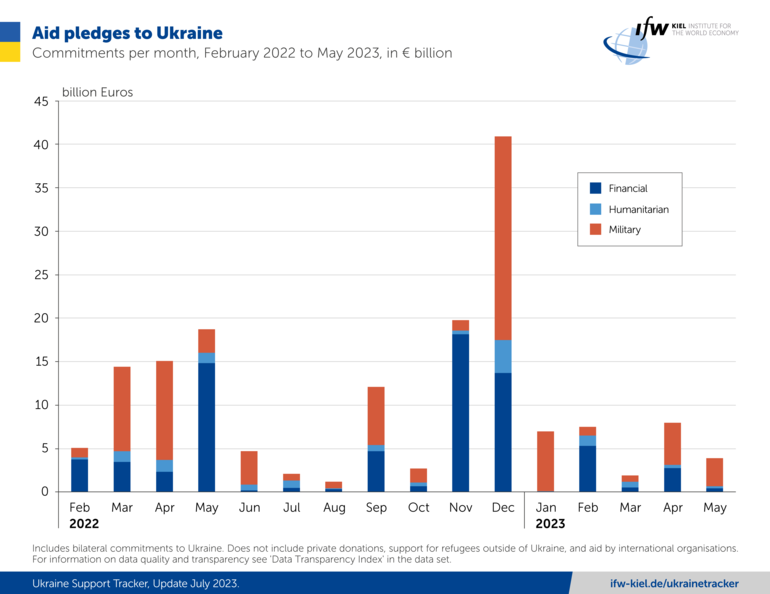As per the latest data analysis from the Ukraine Support Tracker at the Kiel Institute for the World Economy, the total amount of new bilateral support commitments to Ukraine by other countries has remained low during the spring of 2023, despite some larger support packages. Although most of the new pledges were related to military aid, they were not as substantial as earlier in the year, and the delivery of military equipment falls short of the commitments made.
During the covered period from February 25 to May 31, the recorded value of all commitments to Ukraine increased by approximately €13 billion, reaching a total of around €165 billion, out of which nearly €9 billion were allocated for military aid.
- The European Union (EU) expanded the European Peace Facility with two additional tranches worth €1 billion each, totaling €5.6 billion.
- Germany, now the second-largest contributor of military aid in absolute terms, increased its military pledges by €3.26 billion, a 76 percent rise, bringing the total to €7.5 billion. This includes the provision of additional battle tanks, Iris-T air defense systems, and other weapons to enhance Ukraine's air defense capabilities.
- Denmark pledged military support amounting to €1 billion for the entire year, including additional Leopard-2 tanks, marking a €765 million increase compared to late February 2023, representing a 175 percent rise.
- Poland also committed to two new military aid packages worth a combined €581 million, including the delivery of 14 MiG-29 fighter jets, all of which have already been provided to Ukraine.
- Slovakia, alongside Poland, has been the only other country to pledge and deliver fighter jets, with its military aid increasing by €191 million, more than tripling its commitments to Ukraine.
The analysis of relative aid composition over time reveals a growing emphasis on military aid. While military and financial aid had been relatively balanced during the first 10 months of the war, since October 2022, the proportion of military aid among new bilateral commitments has steadily risen. In early 2023, over half of the newly pledged aid was military in nature, which increased to over 70 percent in April and May 2023. Conversely, the share of bilateral financial assistance in the new packages has declined to less than a quarter.
Despite the focus on military commitments, actual deliveries have fallen short of the pledges made
Overall, slightly over half of the heavy weapons that were committed have been delivered. Notably, Western partners such as the United States, Germany, and the United Kingdom quickly increased their committed sums, but the delivery of these pledges remains significantly below expectations. In contrast, Eastern European countries like the Czech Republic, Slovenia, Poland, and Slovakia have delivered more than 80 percent of their promised heavy weapons.

Christoph Trebesch, the head of the Ukraine Support Tracker team and director of a research center at the Kiel Institute, highlights the discrepancy between promised and delivered military aid, particularly among EU countries and the United States. Despite a surge in new pledges ahead of the war's anniversary, the overall level of new commitments from Ukraine supporters has trended downward. The duration of the war and Ukraine's offensive plans have increased the significance of military pledges, but the gap between promises and actual delivery remains considerable.
Furthermore, Iceland has been included in the Tracker as an additional donor country. The Nordic nation transparently published its contributions, consisting of equal parts of humanitarian, financial, and military aid, amounting to €30 million or 0.13 percent of its GDP.

